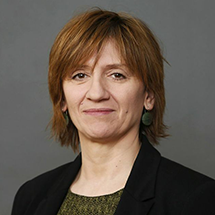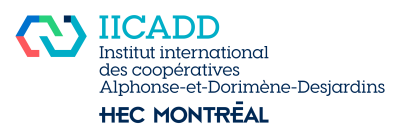
Hello Sonja, welcome to the Institute! Can you tell us a bit about you? Where do you come from?
Thank you! It is really great to be connected to the Institute, after many years of hearing about your work.
I am from Croatia, but came to Canada many years ago as a graduate student. My PhD is from McGill, so I am very happy to be spending more time in Montreal again.
My professional interest and background have roots in the Yugoslav system of self-management. Worker control and democratic decisionmaking were the norm, so my degree in Economics was really focused on collective ownership and self-managed firms.
How did you get into the field of research on cooperatives?
Having arrived in Canada I found the literature on the Yugoslav system, which did not describe what I knew about the institutional arrangements in the economy. I started to research and write about the labour-managed firm and joined the International Association For the Economics of Participation (IAFEP), where research on worker cooperatives overlapped with self-management.
A professional Masters in Co-operative Management was established at Saint Mary’s University in 2002, so I joined the faculty to teach about the co-operative economy. That opened my horizons to other types of co-operatives, and the cooperative movement with shared values and principles. The rest is history.
What’s your current area of interest or focus in cooperatives?
I continue to be drawn to the economic theory of worker cooperatives, because the literature on it is still unsatisfactory.
But besides worker cooperatives, I am also working on co-operative governance more broadly with my colleagues at the International Centre for Cooperative Management at Saint Mary’s, and am particularly interested in highlighting the underlying theoretical assumptions, and showcasing the difference between different types of co-ops and their context. We call it ‘humanistic governance’ to emphasize the focus on people, rather than capital ownership, and to define governance structures and processes that work best for cooperative enterprises.
I am also involved in the project on the impact of Covid-19, with colleagues at IRECUS in Sherbrooke, and Cape Breton University, and a project on sustainability indicators with the United Nations Research Institute for Social Development (UNRISD).
I would like to explore the cooperative circular economy a bit more deliberately, so that is a project for the coming years.
What do you hope to accomplish during your stay at HEC Montréal?
I am particularly excited about re-connecting with some colleagues at HEC and to broaden the network and build new relationships. Another point of interest is to promote the CoopGateway library at the Institute, because it is a rare, and not well known resource for cooperative researchers everywhere. Further, I am looking forward to ideas for joint research projects, such as the circular economy, and a long-term collaboration between our two centres.
As (former) Chair of the Committee on Coop Research at the International Co-operative Alliance (ICA CCR), what do you think could be done to increase research on cooperatives?
I just finished my second-and last- term as Chair of the ICA CCR, so ideas are fresh. Cooperative research needs targeted funding and reaching out to young researchers. Some cooperatives are well connected to universities, especially in Quebec, but a meaningful long-term commitment to develop co-operative researchers is lacking in most places. Creating research Chairs in universities is probably the best strategy that can be used; funding specific projects or partnering with academics to leverage government funding is another option.
Young scholars are critically important in this effort, so financing graduate students, and providing them with data is something cooperatives need to stand behind. In Canada we are familiar with CURA (Community-University Research Alliances) -style funding, where practitioners and researchers come together. I think that is the winning formula for cooperatives since ideas need to be grounded in practice.
The ICA recently formed a think tank (ICETT) which I think is an opportunity to bridge the gap between co-op practice and the research community internationally, engaging co-op researchers – both old and new – in ICETT’s work.
